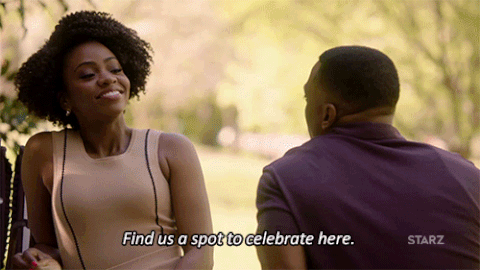Back when I was writing for the local paper here in Nashville, I once interviewed a sex therapist. We covered a lot of ground, but one of the things that he said that has remained in my mind to this day is, "A lot of boys learn about sex from porn. A lot of girls learn from chick flicks and Cosmo. Put those two people in a dark room together and you're going to have a big ole' mess on your hands."
After serving as a teen mom director for the local branch of a national non-profit for several years, and also after being a marriage life coach for even longer than that, I must say that when it comes to sexual preparation—especially as it pertains to a long-term commitment—that sex therapist was spot-on. Sex is a significant, relevant and very necessary part of a relationship. Yet, unfortunately, it's something that couples—including engaged and newlywed couples—do not spend nearly enough time hashing out. It's almost like they think, "We love each other, so the sex thing will work itself out." Will it? Will the bills, the in-law issues and who's going to clean what in the home going to miraculously work itself out without some intentional dialogue? No? Well, why should sex be any different?
If you're currently contemplating marriage and you're going to take "'til death parts us" serious (and please do), sex with your future spouse is going to be a part of your life, hopefully for the rest of it. I don't know about you, but that seems like a good enough of a reason to set aside a few conversations to getting some clarity about your man's views, experiences and expectations—as it specifically pertains to sex.
1. “What did your parents teach you about sex?”

Two myths, that I'm always more than happy to debunk, every chance that I get, is 1) Black women don't get married (the real truth is a lot of us have a bucket list that we'd prefer to complete before saying "I do") and 2) most Black kids grow up without dads. You can read articles like "No, Most Black Kids Are Not Fatherless" or check out the totally adorable YouTube channel Beleaf in Fatherhood to know that is a total fallacy. But when it comes to the missing daddy issue, I'd be very irresponsible if I didn't act like it doesn't exist (reportedly one-third of all U.S. children are living with an unmarried parent) and that the repercussions can be truly heartbreaking.
Take the topic of sex, for example. One of my exes? He knew his father, looks just like the man and yet his dad never claimed him. His mother? I can count at least five times when we tried to get into his house, but the door was locked. Through the window, we could hear her having sex—almost each time with a different man. Fast forward to now, and while my ex is a great never-been-married-before father of four, when I asked him what he's taught his kids about sex, he was like, "I started having sex as a kid. Who am I to be judgmental about their decisions?" For me, it came off as flippant, but what I realize is he didn't know what to do because no one taught him.
Although our parents are not solely responsible for who we become, they are a part of our foundation. Knowing what your man was told, taught and modeled can provide you with a glimpse of his views on sex and, quite possibly, the perspective and values that he'll extend to your own children someday.
2. “What was your first experience like?”
Question. How many men in your life, when they speak of their first time, it sounds healthy? And by "healthy", I mean, they weren't a child who had sex with a grown woman (if they were 14 and she was 18 or older, she was a grown woman and it was statutory rape); they weren't pressured by an older brother or some kids at their school; they weren't molested and they weren't babies at the time (14 is a pretty young to me, but I know some guys who claim to have been 9 or 10 when they gave their virginity away).
I was just telling someone earlier this week that I believe there is such a thing as "sex PTSD" and it's not always from sexual abuse or trauma. Sometimes, it's simply engaging in a sexual experience before we're ready or one that we don't really understand the magnitude of. Then, until or unless we get some clarity, we can end up carrying all of that confusion into our other sexual encounters.
One my partner's first time was with a woman that his brother locked him up in a bedroom with; that same guy ended up date raping me. Another one of my partner's first sexual encounter was with one of his female first cousins. Another one of my partners, he was a preteen who participated in a train with a group of his friends. Two had sex with a babysitter.
Contrary to popular opinion, men are not made out of emotional Teflon. And with articles out here like, "Age Of First Sexual Experience Determines Relationship Outcomes Later In Life", "Does Sexual History Affect Marital Happiness?" and "How Does Sex Affect Your Emotions? 12 Things to Know About Attraction and Arousal"—knowing about your man's first encounter can definitely shed light on some things; whether he believes it has directly affected him or not.
3. “What is your biggest past sexual regret?”

I say it often because it's something that I wholeheartedly believe. I don't trust anyone who says that there is nothing in their life that they don't regret. It's one thing to say you feel like all that you did played a purpose in where you are now; it's something else to say that when you look back over all of the things that you've said or done, you have absolutely no remorse (which is what regret is).
Unless you're about to marry a virgin, I think it's close to impossible for someone to not have any regrets when it comes to their past sexual choices. I regret having sex for the first time in my boyfriend's mother's bed with his little sister asleep in the same room. I regret having sex with people's boyfriends. I regret agreeing to pick up a guy at the side of a dumpster one night, so no one would have to know we were gonna have sex. I regret my abortions.
And here's the thing—had I not made the time to really process and heal from my regrets, I know I would've ended up carrying a bit of bitterness, resentment and baggage into my future marriage bed. It's not just me who feels like this either. Some husbands have told me that now that they are married, they wish they had handled their season of singleness differently too. So yeah, it's a good idea to ask your partner if he has any regrets. If he does, follow that question up with if he's done anything to feel better about the situation—or situations. If he hasn't, encourage him to do so.
4. “Is there any sexual trauma that we should discuss?”
Reportedly, 1 in 6 boys have been molested by the time they turn 18.
I believe it's a lot more than that because at least half of the men in my own world have shared with me that it is a part of their history. As a result, it has made it hard for them to trust, they admit to having some really complicated views about sex and, some of them have made some really toxic sexual decisions, as a way to "process" their sexuality (for instance, some told me that they had sex with lots of women because a man molested them and they were trying to "prove to themselves" that they are heterosexual).
Someone I care deeply for once told me that although he gets plenty—and I do mean, plenty—of female attention, he's not sure if he'll "ever be healthy sexually" due to his childhood sexual abuse. That's a really vulnerable and insightful thing for him to say. But just think about how many men have been molested or raped and don't share their feelings about it. Not enough women ask their partners if there is sexual trauma in their past. But for the sake of a stable and thriving intimacy life, it's one that is beyond valid.
5. “Are all of your sexual relationships and situationships FULLY resolved?”

There's a guy I know who once told me that, for a decade, he had an affair with a married woman. Now that he's married, he still finds himself hittin' that woman up on social media from time to time. In his mind, it's just to see how she's doing. In my mind, he's playing with fire (and yes, I've told him so).
The reason why I say that is because a lot of my exes are married at this point. One of them, because we were homies before sex ever entered into the picture, I used to think it was OK for him to hit me up too. But conversations always eventually turned into a slick sexual statement or strolling down sexual memory's lane which is all kinds of inappropriate. So, even though we used to be friends, because we also used to be more than that and we never really closed that chapter, I had to totally and completely let him go. Otherwise, it was gonna be a slippery slope if we remained in communication.
A lot of married couples deal with jealousy and even slight paranoia in their relationship, not because their spouse has a past, but because they can tell that the past has never been fully resolved. It might hurt to know that your partner still has some "residue" laying around somewhere, but it's better to ask and encourage him to close those doors now than to find out the hard way later that he didn't via an emotional affair—or worse.
6. “What are your sexual expectations?”
When people hear that I have no problem spending 5-6 weeks on intimacy in premarital counseling sessions, they think that I'm being excessive. Whatever. If they knew how much sexual dysfunction I hear about while dealing with couples after they say "I do", they'd get why it's such a priority to me. Being that a lack of intimacy continues to be a leading cause of divorce, and also because I know that a lot of dating couples feel like intimacy is not something that they need to put a lot of forethought into (I mean, we love each other, so what is there to worry about? We got this), that's why I think that intimacy should be explored, almost ad nauseam.
It never fails. Whenever a married couple comes to me about their issues and challenges, it's very rare that sex doesn't come up in the conversation. Someone isn't getting as much as they want, someone isn't getting the kind that they desire, or someone thought that the entire sexual part of their relationship was going to be different.
We all know what assuming can do to a person and having expectations without discussing them first is a form of making assumptions. Whether you've had sex prior to marriage or the plan is to wait until after getting married, you are going to do your future sex life a world of good by asking each other what your expectations are, beforehand.
7. “Do you have any sex-related deal-breakers or hang ups?”

I've shared in one of these articles before that a husband once told me that, in premarital counseling, he expressed how important fellatio was to him. His fiancée was so intent on getting married that she said, in counseling, that she loved to give head; that him getting it on the regular would be no problem. Fast forward to almost a decade into their marriage and, according to him, he only got it twice. He ended up cheating.
Another husband? When he was dating his wife, he told her that sex every day was preferred but if not that, sex every other day was desired. She not only agreed but professed that her drive was also really high. They ended up having sex about once a week. They were married for almost 12 years. They're divorced now.
You can say whatever you want to say about these men and what they wanted going into their marriage, but it's what they wanted. If it's something that sounds ridiculous to you, you're actually proving my point about why it's a good idea to ask your own man this question on the front end.
I know some people who didn't know their partner hates oral or doesn't like to try new things or only wants to have sex in the dark before they married them. They are pretty close to being miserable now. So yeah, figuring out what the potential deal-breakers or hang ups are before marriage is definitely something that should also be discussed. It can only benefit you if you do.
8. “How much of a priority is your health?”
This question might seem like a bit of a wild card, but here's why it's relevant. There's a wife I know who, while she was dating her now-husband, he gave her the impression that she was gonna be swinging from the chandeliers from their wedding night on. He talked such a big game that she was a little intimidated, going into their honeymoon. But from their wedding night on, he has had trouble maintaining an erection because he's overweight and has to take blood pressure medication. It's been well over a decade now. Guess who's the one who isn't sexually satisfied?
Married sex is wonderful. It really is. It's also a responsibility in marriage. And in order to act responsibly when it comes to marital intimacy, one's health must be taken into account. So yeah, inquire about that too.
9. “Do you think there is a difference between single and married sex?”

Single sex can be all kinds of false advertising, boy. After all, when you're single, you are your top priority and so, it's pretty common to mostly and mainly consider yourself, even when it comes to sex.
If you take out the time to read "10 Wonderful Reasons Why Consistent Sex In Marriage Is So Important", hopefully you'll see that married sex is very different from sex you may be having as a single individual. Shoot, the "forever exclusivity" of the dynamic is enough to set it apart.
Even while dating, different couples have different "rules". Maybe you don't mind your man going to a strip club with his friends. Maybe you're not as upset if you find out he watches porn. Maybe there are certain things that he wants you to do that you concede to because "It's not like it's all of the time."
Most of the men that I know, they are pretty literal. When it comes to this topic, what I mean by that is if you give your partner the impression that nothing has to change from his single life, it probably won't. So, if you've got other thoughts, this would be the time to bring them up. Stat.
10. “How important are my needs going to be?”
Something that I had to learn the hard way about sex—and by sex, I mean good sex—is sometimes, even your pleasure is all about a man's ego. What I mean by that is some men aren't great in bed because they are trying to connect with their partner and meet her needs. Sometimes they are, just so they can feel good about themselves; it's all about patting themselves on the back (by the way, I believe that there is even such a thing as "sexual narcissism"; you can read more about it here). The problem with this kind of individual is they tend to not emotionally invest well. Plus, the sex will only be good if they want it to be that way. Who wants to spend forever with an individual like that?!
So yeah, it would be ludicrous of me to not close this out with a question that could've been the first one, to tell you the truth. Before marrying "him", discuss what your own sexual needs and desires are, get a read for how he feels about each and every one of them, and discuss if they are going to be a priority or not.
Marriage is supposed to be for life. Both partners should be willing to spend a lifetime pleasing one another in the best ways possible; this includes sexually. A good way to know if that is a part of your partner's plan is to well, ask him.
Want more stories like this? Sign up for our newsletter here and check out the related reads below:
10 Married Couples Share The Keys To Their Totally Off-The-Chain Sex Life
How PCOS Strengthened This Couple's 4-Year Marriage
If You're In A Committed Relationship, Avoid These Sex Mistakes At All Costs
6 Tips For Dealing With A Sexually Incompatible Spouse
Feature image by Giphy
- 9 Sex Questions To Ask Your Partner - xoNecole: Women's Interest, Love, Wellness, Beauty ›
- Questions You Should Ask Before You Have Sex - xoNecole: Women's Interest, Love, Wellness, Beauty ›
- Third Date Questions To Ask A Guy - xoNecole: Women's Interest, Love, Wellness, Beauty ›
- Get Clear About Where and How You’ve Changed - xoNecole: Women's Interest, Love, Wellness, Beauty ›
- 2. Am I Getting What I Need from My Sexual Experiences? - xoNecole: Women's Interest, Love, Wellness, Beauty ›
- Signs You And Your Partner Should See A Sex Therapist - xoNecole ›
- 8 Things To Discuss Before Marriage - xoNecole ›













